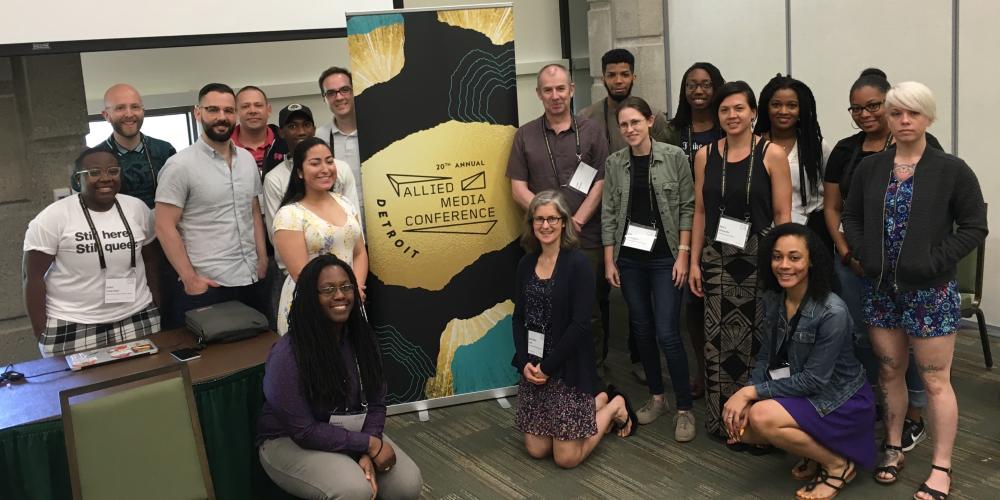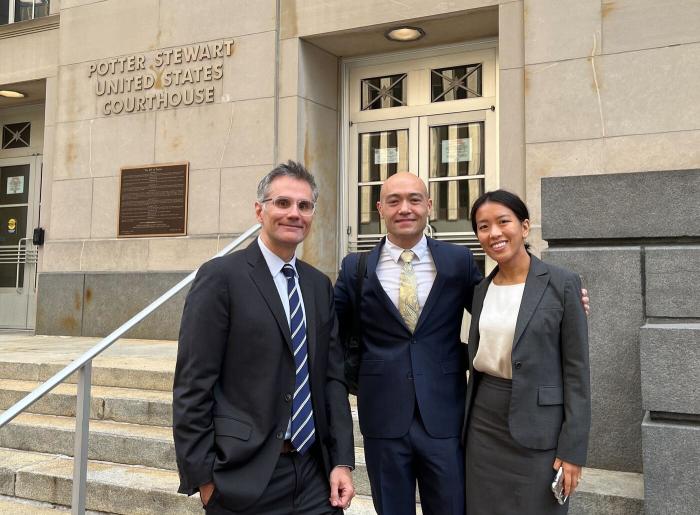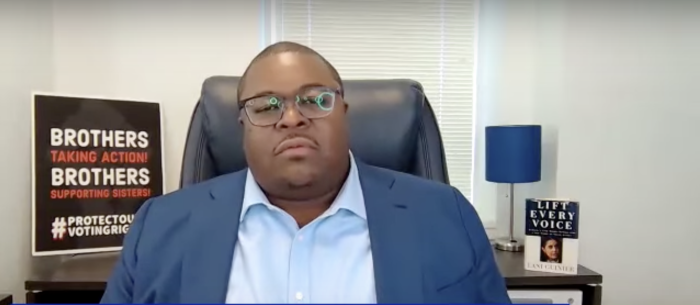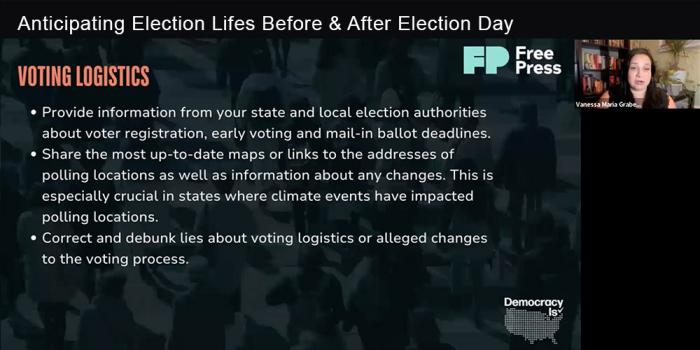Free Press Brings Inspiration and Insight to AMC

The Allied Media Conference is a powerful gathering of more than 3,000 artists, activists and media makers from around the globe, organized by Allied Media Projects — a women-of-color-led organization. Over the course of 4 days in Detroit, attendees told stories, shared learnings and affirmed our ability to forge a healing future.
Team Free Press journeyed to AMC with the honor of presenting three workshops, a convening and an awesome media-justice mixer.
#OwningOurStories: A Convening on Race and the Media
We began the weekend with “Owning Our Stories,” part of an ongoing convening that is the brainchild of Free Press Senior Director of Strategy Joseph Torres and consultant Manolia Charlotin. The initiative has been in progress since December 2017; prior to AMC it had already yielded one meet-up and a powerful commemoration of the 50th anniversary of the Kerner Commission’s reporting on race and the media.
This time around, the team plus a few new faces gathered for an invitation-only event at Baltimore Gallery, a Black-owned business in Detroit. (A number of invite-only networking and strategy sessions are usually part of AMC.)
This incredible roundtable included:
-
Facilitator Sage Crump, a multimedia performance artist and cultural strategist
-
Lori Robinson, journalist, public speaker and author of I Will Survive: The African-American Guide to Healing from Sexual Assault and Abuse
-
Roberta Rael, executive director of Generation Justice
-
Janine Jackson, program director at FAIR (Fairness and Accuracy in Reporting) and producer/host of the radio show CounterSpin
-
Teresa Basilio Gaztambide, independent consultant, former deputy director of New America's Resilient Communities Program and co-director of the Global Action Project
-
Maria Agui Carter, award-winning filmmaker and assistant professor of visual and media arts at Emerson College
-
Dr. Yaba Blay, producer of #ProfessionalBlackGirl and the Dan Blue Endowed Chair in Political Science at North Carolina Central University
-
Khaled Beydoun, critical race theorist, author of American Islamophobia and associate professor of law at the University of Detroit Mercy School of Law
-
Bree Newsome, organizer, filmmaker, producer and director of the performance piece Rise Up and Go
-
Messiah Ramkissoon, poet, emcee, educator, director and facilitator of Friends of Island Academy
-
Steven Renderos, organizing director of the Center for Media Justice
-
Muthi Reed, multidisciplinary artist, producer and director of MuthiReed-YouTube
The convenors engaged in a rich conversation around the role of the media in society — who gets to participate and how — and methods for disrupting White supremacy to spark a media system that no longer harms but serves communities of color.
Building on this generative conversation, the group is already planning to meet up later this year for continued collaboration on telling the story of race and the media.
Workshop: Team Internet — What We Learned
The next day, Free Press Action Fund Field Director Mary Alice Crim and Organizer Brandon Forester joined allies to present the workshop “Team Internet: What We Learned Organizing to Save Net Neutrality.”
Mary Alice opened the workshop with an introduction to Net Neutrality, and how we arrived at both victory in 2015 and the major setback of 2017’s repeal.
Up next, Brandon discussed the massive outcry that met the Trump FCC's decision, and how our Team Internet initiative channels outrage into action — to the tune of more than 400,000 volunteers. From text messaging to lawmaker visits to social-media posting, the work of Team Internet is an amazing testament to people power.
AMC isn’t just a place to present, but also a space to invite everyone in a room into conversation. As Team Internet is continuing to fight and evolve, the “fishbowl” conversation that ended the session allowed the whole room to puzzle together about how groups nationally and locally could better turn the enormous popular support for Net Neutrality into direct action and power building.
Panel discussion: Owning Our Stories II
On Saturday, the “Owning Our Stories” team gathered once more, this time for a powerful panel discussion on the history of race and the media.
Free Press’ Joseph Torres and Generation Justice Executive Director Roberta Rael outlined the deep history of narratives as a tool of oppression — the first published word in the United States was a 1690 colonial newspaper referring to indigenous people as “savages”. Torres and Rael also discussed the need to go beyond a focus on “newsroom diversity” to a deeper discussion of structural racism within the media system.
Bringing the entire room to rousing applause, filmmaker Maria Agui Carter delivered an emotional testimony on how present-day media coverage is compounding the devastation residents of Puerto Rico face as they struggle to recover from Hurricane Maria.
Attendees learned about the many ways that narratives are shaped and delivered, the power dynamics that define our media system, and how people of color can challenge the status quo.
Workshop: Building Relationships to Transform Local News
On the final day of AMC, Free Press Organizer Alicia Bell, who is part of the organization’s News Voices: North Carolina team, presented a workshop on how community relationships can transform local journalism. Alicia has held gatherings on this topic across News Voices’ focus locales of New Jersey and North Carolina, and was excited to share what they’ve learned with this audience.
Alicia helped participants understand that relationships can be forged among reporters, newsrooms and communities in very similar ways to how we develop them interpersonally as friends, family members and colleagues. The conversations that come from those relationships are key to disrupting harmful norms in reporting, and can result in more people power for positive change.
Media-justice mixer
On Saturday, Free Press co-hosted a fun mixer with our friends at the Center for Media Justice. The event united organizers and groups from across the nation that advocate for a just media system. Many youth in particular were present — giving us great hope for the future of our work.
Following greetings from Free Press, the Center for Media Justice and the latter’s membership network MAG-Net, attendees got the chance to mix and mingle. There were door-prize giveaways, snacks and much to enjoy. The mixer was a relaxed, spirited hour for building relationships that reflect the world we want to see.
The magic of AMC
Throughout AMC, plenary sessions gathered nearly the entire conference together to hear from an inspiring and diverse lineup of artists, leaders, youth and more.
The opening ceremony featured a conversation between #MeToo founder Tarana Burke and activist Mariam Kaba, plus a breathtaking performance from Detroit’s RV Mendoza. And for the closing ceremony, facilitator and activist adrienne maree brown brought the incredible insight of her work in Emergent Strategy to a spell that everyone recited together:
“we plant the seeds of radical honesty
vulnerability, authenticity
and the kindness that eases inevitable change
we will not settle!
we will grow weirder and wilder
more interdependent
for our liberation
for our liberation
for our liberation!”
(excerpted from instagram.com/adriennemareebrown)
In this way, and through the entire slate of programs, AMC centered and affirmed the lives and dignity of all people on the margins in a way that few other conferences do.
Team Free Press had an amazing time — and can’t wait to continue the learning and connection next year.








